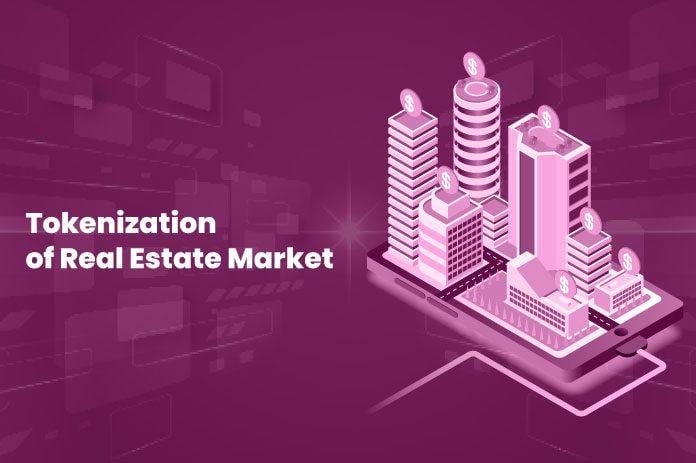What is the Tokenization of Real Estate?
Tokenization converts an asset or object into digital tokens that can be traded and transacted on a blockchain network. In the real estate market, Tokenization refers to dividing a property into digital tokens, each representing a fractional ownership interest or a specific right in the property.How does Tokenization work in Real Estate?
Tokenization involves converting property ownership into digital tokens, which allows investors to purchase fractional shares of a property, allowing them to invest in high-value properties that were previously inaccessible. The process of Tokenization involves:- Conducting thorough due diligence on the property.
- Creating a legal structure.
- Issuing tokens to represent ownership rights.
Benefits of Tokenization in the Real Estate
There are several benefits of Tokenization in real estate:Increased liquidity
Traditionally, real estate is illiquid, meaning it is not easily bought or sold. Through Tokenization, real estate assets can be divided into digital tokens and traded on online platforms, increasing liquidity and providing investors with an easier exit strategy.Fractional ownership
Tokenization allows for fractional ownership So that investors can purchase smaller portions of a property through tokens that open up real estate investment opportunities to a wider range of investors who may not have the capital to buy a whole property.Accessibility
Tokenization makes investing in real estate assets possible without the need for substantial upfront capital or the hassle of property management. It allows retail investors to access real estate investments traditionally accessible only to high-net-worth individuals and institutional investors.Transparency
Blockchain technology, often used for Tokenization, offers transparency in real estate transactions. All transactions are recorded on a decentralized and immutable ledger, providing a transparent view of ownership, transfers, and valuations. It helps to reduce fraud and increase trust in the real estate market.Global market access
Tokenization allows real estate assets to trade globally, breaking geographical barriers easily. Investors worldwide can participate in real estate investments, leading to increased diversification and a broader investor base.Efficiency
Tokenization of real estate streamlines the process of buying, selling, and managing property. It eliminates intermediaries, reduces paperwork, and automates several administrative tasks, leading to cost savings and improved operational efficiency.Increased investment opportunities
Tokenization expands the range of real estate investment opportunities beyond traditional residential and commercial properties. It enables the Tokenization of various real estate assets, such as rental properties, hotels, resorts, and even development projects, providing investors with a wider array of options. Overall, Tokenization in real estate has the potential to revolutionize the industry by providing the above benefits while also opening up new investment avenues.Tokenization Process in the Real estate market
Tokenization is the process of representing real estate assets as digital tokens on a blockchain or other distributed ledger technology that enables the fractional ownership of real estate and facilitates the trading of these digital tokens more efficiently and transparently. Here is an overview of the tokenization process in the real estate market:Asset selection and valuation
The first step is to select the real estate asset that will be tokenized, which includes evaluating the property’s location, market demand, and potential for rental income or capital appreciation. Asset valuation is crucial to determine the tokenization value and the number of tokens to be issued.Legal and regulatory considerations
Tokenizing real estate involves complying with various legal and regulatory requirements, which include understanding securities laws, property rights, land use regulations, and tax implications. Legal professionals must draft tokenization agreements, establish ownership structures, and ensure compliance with local regulations.Token issuance and distribution
Once the asset is selected and legal considerations are addressed, the tokens representing fractional ownership of the real estate asset are issued. It can do through a token generation event (TGE), where investors purchase the tokens using cryptocurrency or traditional fiat currency. The tokens can be distributed through a smart contract, which automatically assigns ownership to investors in proportion to their investment.Secondary market trading and exit options
After the token issuance, investors can trade their tokens on secondary markets. These markets provide liquidity and allow investors to buy or sell their tokens. Trading can occur on decentralized exchanges or through over-the-counter (OTC) platforms. This secondary market trading allows investors to exit their investment before the property is sold or to diversify their real estate portfolio. Ensure that the tokenization process may vary depending on the specific platform or blockchain technology used. Compliance with local laws and regulations is crucial to ensure the legitimacy and security of tokenized real estate investments. Investors should exercise due diligence and seek professional advice when considering tokenized real estate investments.Challenges and Risks of Tokenization in Real Estate
Tokenization isn’t an easy process; many challenges and risks are associated with it. Here are the primary risks of Tokenization:Regulatory Hurdles and Compliance Requirements
Tokenization of real estate involves creating security tokens, which may be subject to various regulatory requirements and compliance obligations, which include,- Compliance with securities laws
- Anti-money laundering (AML) regulations
- Know-your-customer (KYC) processes
- Other investor protection regulations


